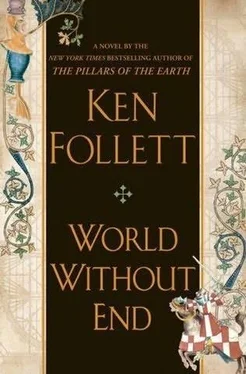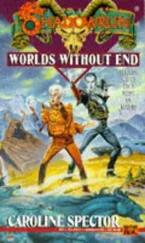“All right,” Merthin said, but he did not move. He was giving Ralph a queer look.
Ralph said: “What’s the matter with you?”
“You don’t change, do you?”
Ralph shrugged. “Does anyone?”
Godwyn was completely fascinated by Timothy’s Book. It was a history of Kingsbridge Priory and, like most such histories, it began with the creation by God of heaven and earth. But mostly it recounted the era of Prior Philip, two centuries ago, when the cathedral was built – a time now regarded by the monks as a golden age. The author, Brother Timothy, claimed that the legendary Philip had been a stern disciplinarian as well as a man of compassion. Godwyn was not sure how you could be both.
On the Wednesday of Fleece Fair week, in the study hour before the service of Sext, Godwyn sat on a high stool in the monastery library, the book open on a lectern before him. This was his favourite place in the priory: a spacious room, well lit by high windows, with almost a hundred books in a locked cupboard. It was normally hushed, but today he could hear, from the far side of the cathedral, the muffled roar of the fair – a thousand people buying and selling, haggling and quarrelling, calling their wares, and shouting encouragement at cock-fighting and bear-baiting.
At the back of the book, later authors had tracked the descendants of the cathedral builders down to the present day. Godwyn was pleased – and frankly surprised – to find confirmation of his mother’s theory that she was descended from Tom Builder through Tom’s daughter Martha. He wondered what family traits might have come down from Tom. A mason needed to be a shrewd businessman, he supposed, and Godwyn’s grandfather and his uncle Edmund had that quality. His cousin Caris also showed signs of the same flair. Perhaps Tom had also had the green eyes flecked with yellow that they all shared.
Godwyn also read about Tom Builder’s stepson, Jack, the architect of Kingsbridge Cathedral, who had married the Lady Aliena and fathered a dynasty of earls of Shiring. He was the ancestor of Caris’s sweetheart, Merthin Fitzgerald. That made sense: young Merthin was already showing unparalleled ability as a carpenter. Timothy’s Book even mentioned Jack’s red hair, which had been inherited by Sir Gerald and Merthin, though not Ralph.
What interested him most was the book’s chapter on women. It seemed there had been no nuns at Kingsbridge in Prior Philip’s day. Women had been strictly forbidden to enter the monastery buildings. The author, quoting Philip, said that if possible a monk should never look at a female, for his own peace of mind. Philip disapproved of combined monastery-nunneries, saying the advantages of shared facilities were outweighed by the opportunities for the devil to introduce temptation. Where there was a double house, the separation of monks and nuns should be as rigid as possible, he added.
Godwyn felt the thrill of finding authoritative support for a pre-existing conviction. At Oxford he had enjoyed the all-male environment of Kingsbridge College. The university teachers were men, as were the students, without exception. He had hardly spoken to a female for seven years and, if he kept his eyes on the ground as he walked through the city, he could even avoid looking at them. On his return to the priory, he had found it disturbing to see nuns so frequently. Although they had their own cloisters, refectory, kitchen and other buildings, he met them constantly in the church, the hospital, and other communal areas. At this moment there was a pretty young nun called Mair just a few feet away, consulting an illustrated book on medicinal herbs. It was even worse to encounter girls from the town, with their close-fitting clothes and alluring hairstyles, casually walking through the priory grounds on everyday errands, bringing supplies to the kitchen or visiting the hospital.
Clearly, he thought, the priory had fallen from Philip’s high standards – another example of the slackness that had crept in under the rule of Anthony, Godwyn’s uncle. But perhaps there was something he could do about this.
The bell rang for Sext, and he closed the book. Sister Mair did the same, and smiled at him, her red lips forming a sweet curve as she did so. He looked away and hurried out of the room.
The weather was improving, the sun shining fitfully between showers of rain. In the church, the stained-glass windows brightened and faded as patchy clouds blew across the sky. Godwyn’s mind was equally restless, distracted from his prayers by thoughts of how he could best use Timothy’s Book to inspire a revival in the priory. He decided he would raise the subject at chapter, the daily meeting of all the monks.
The builders were getting on quickly with the repairs to the chancel after last Sunday’s collapse, he noted. The rubble had been cleared away and the area had been roped off. There was a growing stack of thin, lightweight stones in the transept. The men did not stop work when the monks began to sing – there were so many services during the course of a normal day that the repairs would have been severely delayed. Merthin Fitzgerald, who had temporarily abandoned his work on the new door, was in the south aisle, constructing an elaborate spider web of ropes, branches and hurdles on which the masons would stand as they rebuilt the vaulted ceiling. Thomas Langley, whose job it was to supervise the builders, was standing in the south transept with Elfric, pointing with his one arm at the collapsed vault, obviously discussing Merthin’s work.
Thomas was effective as matricularius: he was decisive, and he never let things slip. Any morning the builders failed to show up – a frequent irritation – Thomas would go and find them and demand to know why. If he had a fault, it was that he was too independent: he rarely reported progress or asked Godwyn’s opinion, but got on with the work as if he were his own master rather than Godwyn’s subordinate. Godwyn had an annoying suspicion that Thomas doubted his ability. Godwyn was younger, but only slightly: he was thirty-one, Thomas thirty-four. Perhaps Thomas thought that Godwyn had been promoted by Anthony under pressure from Petranilla. However, he showed no other sign of resentment. He just did things his own way.
As Godwyn watched, murmuring the responses of the service automatically, Thomas’s conversation with Elfric was interrupted. Lord William of Caster came striding into the church. He was a tall, black-bearded figure very like his father, and equally harsh, though people said he was sometimes softened by his wife, Philippa. He approached Thomas and waved Elfric away. Thomas turned to William, and something in his stance reminded Godwyn that Thomas had once been a knight, and had first arrived at the priory bleeding from the sword wound that had eventually necessitated the amputation of his left arm at the elbow.
Godwyn wished he could hear what Lord William was saying. William was leaning forward, speaking aggressively, pointing a finger. Thomas, unafraid, answered with equal vigour. Godwyn suddenly remembered Thomas having just such an intense, combative conversation ten years ago, on the day he arrived here. On that occasion, he had been arguing with William’s younger brother, Richard – then a priest, now the bishop of Kingsbridge. Perhaps it was fanciful, but Godwyn imagined they were quarrelling about the same thing today. What could it be? Could there really be an issue between a monk and a noble family that was still a cause of anger after ten years?
Lord William stamped off, evidently unsatisfied, and Thomas turned back to Elfric.
The argument ten years ago had resulted in Thomas’s joining the priory. Godwyn recalled that Richard had promised a donation to secure Thomas’s admittance. Godwyn had never heard any more about that donation. He wondered if it had ever been paid.
Читать дальше












